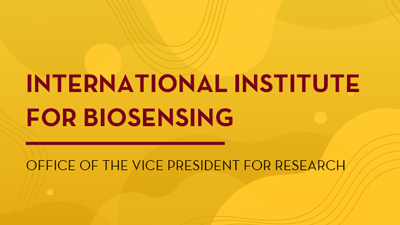
The International Institute for Biosensing (IIB) will provide support for the development of a globally engaged institute at the University of Minnesota. Biosensing is a fundamental global technology for the 21st century with tremendous implications for humans and the environment. Biosensors serve as critical monitors in a broad spectrum of applications, including food safety, agriculture, the environment, healthcare, animal health, national security and water quality.
The IIB will bring together an international coalition of experts from academia, nonprofits, industry, and government agencies to create a collective global effort to identify and overcome technical barriers to advancing biosensing research.
University of Minnesota researchers have an opportunity to seek support for graduate students through an initial request for proposals outlined below. PhD students supported by these awards will form the core of a UMN cohort that will meet regularly and be connected to national and international peers through the IIB, which will be operated through the University.
Funding Cycle
The IIB opens in the fall. There will be just one grant cycle that will support three to five projects of up to $225,000 per award ($75,000 per year for three years) with funding primarily allocated to support a PhD candidate.
See a list of the 2023 International Institute for Biosensing Awardees.
Deadlines
11/18/22: Letter of intent due (by 5:00 p.m. CST)
11/21/22: Application opens
12/12/22: PI submits application to approvers (by 11:59 p.m. CST)
12/15/22: Approvers submit application to RIO (by 11:59 p.m. CST)
February 2023: Award notification
08/01/23: Award period begins
Eligibility Requirements
Eligibility requirements for the IIB include:
- The PI/applicant must be from the University of Minnesota
- The funds must be spent at the UMN (except for student travel)
- Project proposals must address one or more of the five critical focus areas (see below) designed to rapidly advance the scientific understanding, technological capabilities, and research infrastructure of biosensing research at the University
Proposal Requirements
To facilitate interdisciplinary interactions and create a cohort of a globally connected student community, the program is structured as follows:
- Each proposal should have at least one Co-PI from a biological discipline (e.g. biology, medicine, pharmacy, dentistry, etc.) and another Co-PI from a non-biological discipline (engineering, physical sciences, social science, business, etc.)
- Funding will be mostly allocated to support the PhD student assistantship (salary, fringe, tuition), materials and supplies, and travel for the student to visit at least one partner institution. For budgeting purposes, and if relevant for the proposed research project, please use one of these locations as the travel site: “Johns Hopkins University”, “UC San Diego”, “Monash University, Australia”, “University of Rome, Italy”, and “U Kiel, Germany”. These institutions have expressed interest in participating in the IIB.
- Five students are expected to be funded in the year 2023. Funded students will work as part of Cohort 1, that meets on a regular basis and shares knowledge and ideas with each other. The cohort will also interact with students at other national and international partner institutions.
Each proposal is required to address one or more of the following five focus areas:
Focus Areas
- Addresses sensing architecture that determines the approach for measuring the analyte
- Examines biorecognition molecules that interact with the analytes to produce a signal
- Addresses transduction methods to convert the fundamental interactions and responses into a measurable signal. To have a complete representation of capabilities and the knowledge-base, the transduction mechanism is grouped with control schemes, characterization techniques, and imaging modalities
- Involves computational methods for reading, learning, and displays and leverages the rapid progress in computational modeling, data analytics, and machine learning approaches
- Entails system development that consists of packaging and interfaces for external integration
See the IIB Call for Proposals for more detail about proposal content and format, anticipated program outcomes, and budget.
Evaluation Criteria
Research and scholarly proposals will be evaluated by peer review using the following criteria:
- Scientific impact, including integration of disciplines involved
- The quality of the research design
- The feasibility of the plan of operation
- Student engagement plan
- Mentoring plan
How to Apply
Mandatory Letter of Intent
A letter of intent (see required LOI template) must be submitted to facgrant@umn.edu with “IIB LOI” in the subject line.
Include the following on the prescribed form:
- The title of the proposal
- Principal investigators (PIs) name, department, and email address. Identify one of the co-PIs as the one who will be in charge of correspondence with RIO and will be the named PI on the application.
- A brief description of the nature of the proposed project (200 words or less)
- The names and email addresses of two or three potential UMN faculty reviewers who would not be directly involved with the project
Note: We do not issue invitations following the submission of the LOI. Everyone who submits an LOI is invited to submit a full proposal unless you hear from us.
Proposal Submission
Please refer to the Application Instructions for information about our submission process, including required attachments and approver routing.
Direct questions to facgrant@umn.edu.
Start a New Application
Start a new application during an open funding cycle (see Availability/Deadlines). Only applications submitted through this system are accepted; fax, email, and paper copy applications will not be accepted.
If you click on the new application link when a competition is closed you will not be able to apply and will receive a message that says, "This competition type is currently closed. Please contact facgrant@umn.edu for more information."
Edit an Existing Application
To edit an existing application, choose “RIO Research Infrastructure Investment Program” from the Process list (top left corner). Click on “My actions to do”. Click on the link in the "Action" column. On the next screen you will see your application. Note: Only applications created in the current competition will be accepted.